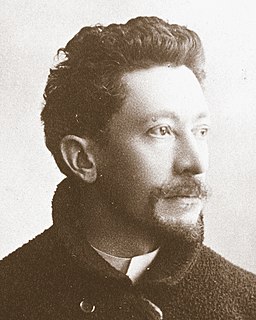A Quote by Samuel R. Delany
The emblem of a philosophy is not that it contains a set of specific thoughts , but that it generates a way of thinking.
Quote Topics
Related Quotes
Philosophy appears to some people as a homogenous milieu: there thoughts are born and die, there systems are built, and there, in turn, they collapse. Others take Philosophy for a specific attitude which we can freely adopt at will. Still others see it as a determined segment of culture. In our view Philosophy does not exist.
When our thoughts revolve we are so often deceived into supposing that their violent movement is an indication of their vigorous originality, the upheaval of prejudice and fixed ideas, when all the time it is more likely that the machine which contains them is only an elaborate cement-mixer, and when the thinking is finished, those whirling thoughts are smoothed into the unchanged conventional mould and seeing them set solid enough to dance, to build, to travel upon, we would never dream of their first deceit, of the hope once roused by their apparently violent reorganisation.
First Thoughts are the everyday thoughts. Everyone has those. Second Thoughts are the thoughts you think about the way you think. People who enjoy thinking have those. Third Thoughts are thoughts that watch the world and think all by themselves. They’re rare, and often troublesome. Listening to them is part of witchcraft.
I would say to anybody who thinks that all the problems in philosophy can be translated into empirically verifiable answers - whether it be a Lawrence Krauss thinking that physics is rendering philosophy obsolete or a Sam Harris thinking that neuroscience is rendering moral philosophy obsolete - that it takes an awful lot of philosophy - philosophy of science in the first case, moral philosophy in the second - even to demonstrate the relevance of these empirical sciences.
The rhythm of walking generates a kind of rhythm of thinking, and the passage through a landscape echoes or stimulates the passage through a series of thoughts. The creates an odd consonance between
internal and external passage, one that suggests that the mind is also a landscape of sorts and that walking is one way to traverse it. A new thought often seems like a feature of the landscape that was
there all along, as though thinking were traveling rather than making.
Do you have to think specific positive thoughts about your body in order for your body to be the way you want it to be? No. But you have to not think the specific negative thoughts. If you could never again think about your body and, instead, just think pleasant thoughts - your body would reclaim its place of Well-being.
Philosophy aims at the logical clarification of thoughts. Philosophy is not a body of doctrine but an activity. A philosophical work consists essentially of elucidations. Philosophy does not result in 'philosophical propositions', but rather in the clarification of propositions. Without philosophy thoughts are, as it were, cloudy and indistinct: its task is to make them clear and to give them sharp boundaries.
I intend Deaths in Venice to contribute both to literary criticism and to philosophy. But it's not "strict philosophy" in the sense of arguing for specific theses. As I remark, there's a style of philosophy - present in writers from Plato to Rawls - that invites readers to consider a certain class of phenomena in a new way. In the book, I associate this, in particular, with my good friend, the eminent philosopher of science, Nancy Cartwright, who practices it extremely skilfully.
Inquiry appears to be a process of thinking, but actually it's a way to undo thinking. Thoughts lose their power over us when we realize that they simply appear in the mind. They're not personal. Through The Work, instead of escaping or suppressing our
thoughts, we learn to meet them with unconditional love and understanding.


































